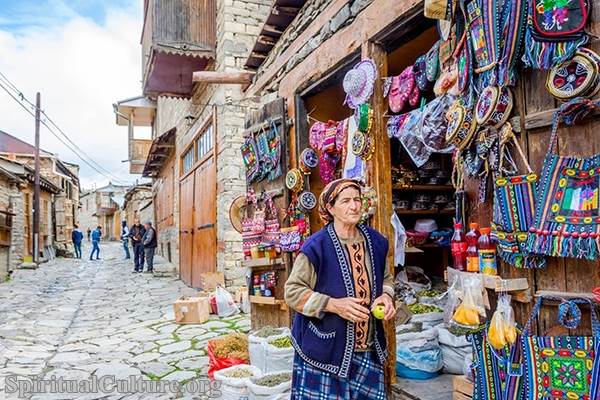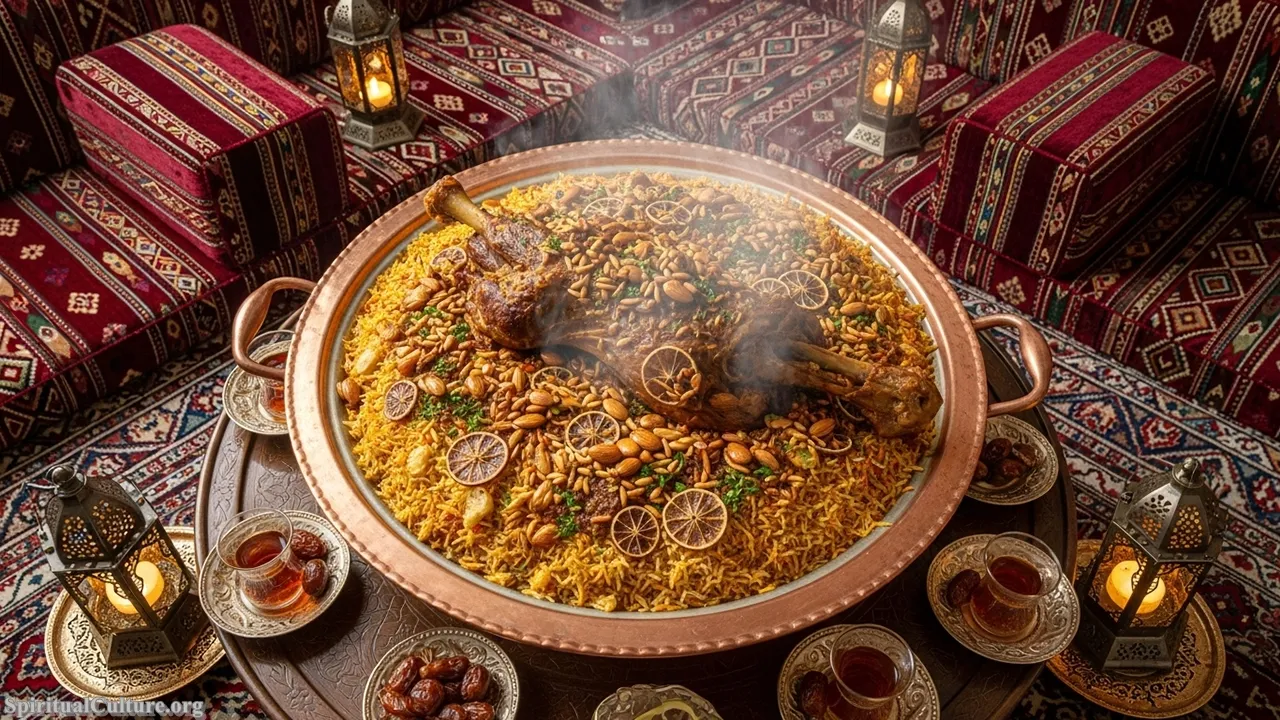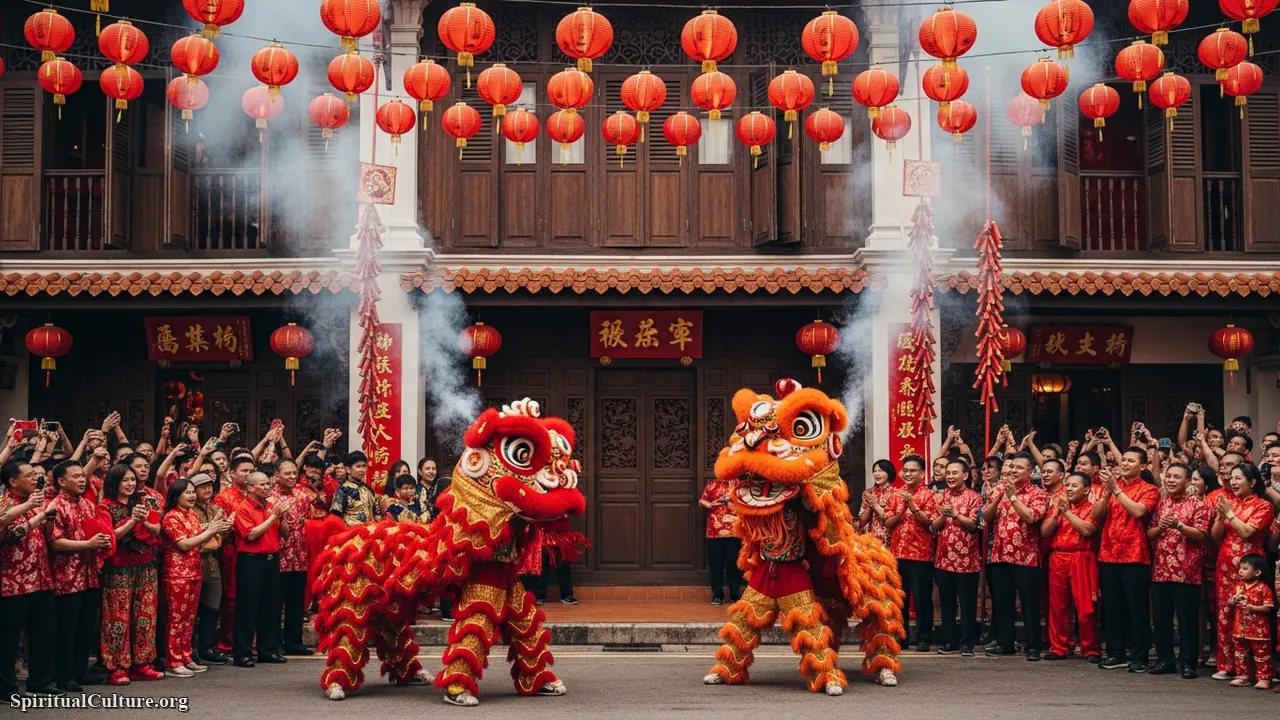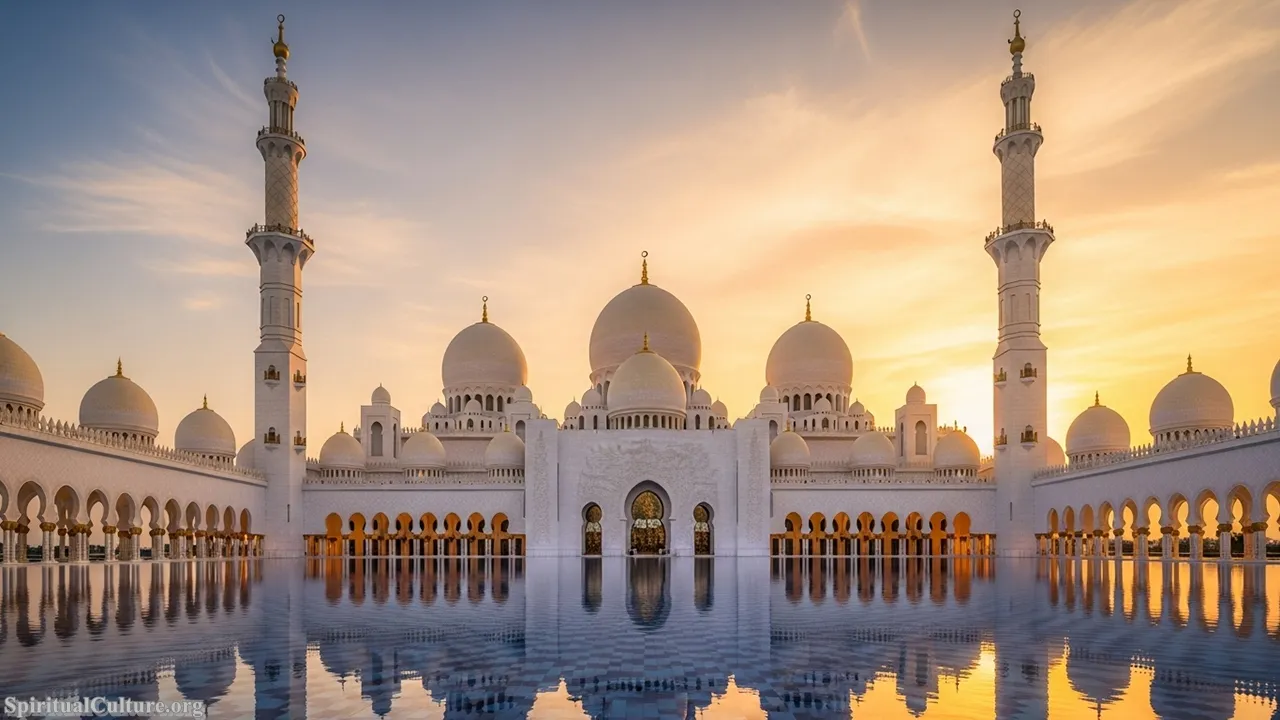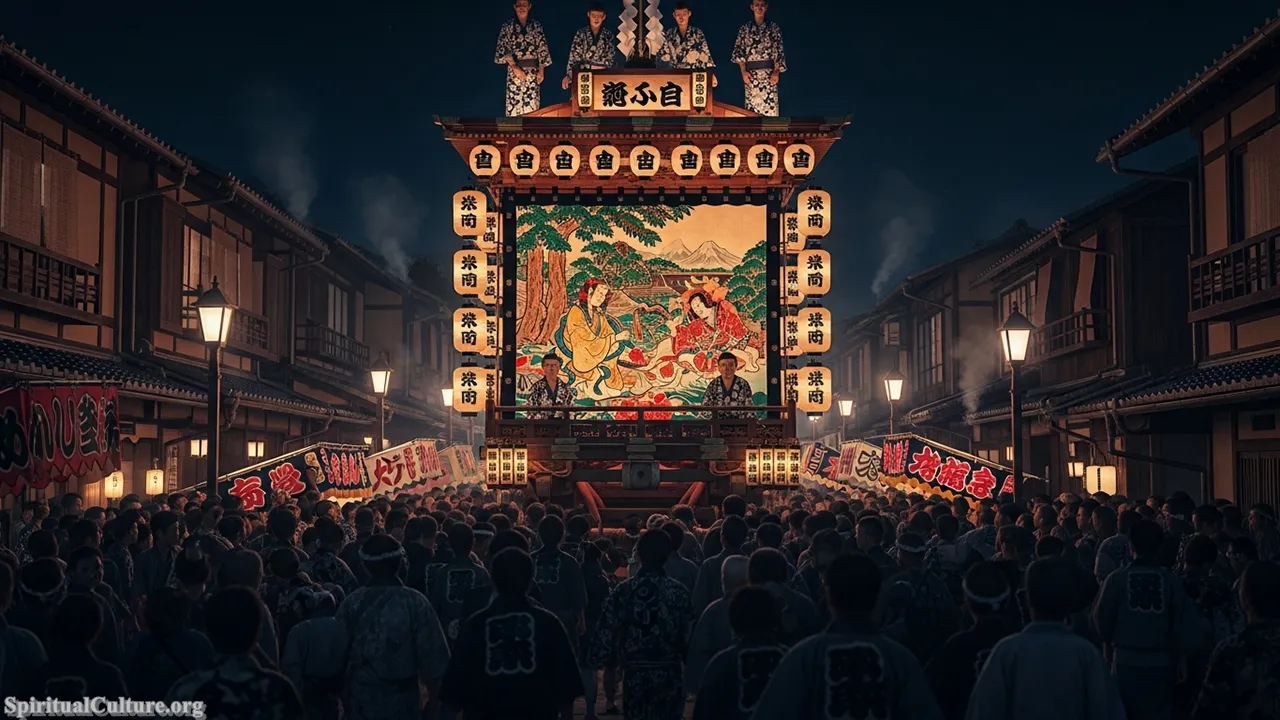Qatar, a nation at the crossroads of ancient Bedouin tradition and ultra-modern ambition, hosts a vibrant calendar of festivals that beautifully reflect its unique cultural soul. These events are far more than mere entertainment; they serve as critical touchstones for preserving Islamic faith, national identity, and centuries-old customs like pearl diving and falconry. The essence of the Qatari experience lies in understanding the deep spiritual and historical context embedded within its modern celebrations.
As of the Current Time of Writing, November 2025, the cultural landscape remains dynamic, blending globally recognized events with the timeless observance of Islamic holy days. Our Spiritual Culture ranking cuts through the noise of popular events to focus on festivals that provide the most profound insights into the nation’s heritage, spiritual values, and cultural continuity. Whether they are solemn religious observances or lively national commemorations, each festival in this list is an unmissable window into the Qatari heart.
We delve beyond sheer attendance figures, prioritizing the events’ historical gravity, communal spiritual impact, and effectiveness in connecting the current generation with their past. The following Top 10 showcases the power of collective heritage in one of the world’s most rapidly evolving states, validated by cultural significance as of the current period.</
Table of the Top 10 Cultural Festivals in Qatar by Spiritual and Historical Significance
| Rank | Festival Name | Primary Significance | Approximate Timing (Current Time of Writing) | Cultural Venue/Focus |
|---|---|---|---|---|
| 1 | Eid al-Fitr | Religious/Spiritual conclusion of Ramadan. | Late March/Early April (Islamic Calendar) | Nationwide Mosques, Family Gatherings |
| 2 | Qatar National Day (QND) | National Unity and Founding of the State (1878). | December 18th | Doha Corniche, Darb Al Saai |
| 3 | Eid al-Adha | Religious/Spiritual ‘Festival of Sacrifice.’ | June (Islamic Calendar) | Nationwide Religious Observance |
| 4 | Katara Traditional Dhow Festival | Preservation of Maritime and Seafaring Heritage. | Late November/Early December | Katara Cultural Village Beach |
| 5 | Garangao Children’s Festival | Cultural/Spiritual Mid-Ramadan children’s tradition. | 14th Day of Ramadan | Neighborhoods, Schools, Cultural Centers |
| 6 | Al-Shahaniya Camel Racing | Preservation of Bedouin Desert Heritage and Sport. | October to February (Mainly) | Al-Shahaniya Racetrack |
| 7 | Marmi Festival (Falconry) | Preservation of Falconry Tradition and Hunting Arts. | January/February | Mesaieed/Sealine Desert |
| 8 | Local Dates Festival | Celebration of Date Palms (National Fruit) & Food Security. | Late July/Early August | Souq Waqif |
| 9 | Ajyal Film Festival | Nurturing Youth, Storytelling, and Arab Cinema. | November | Katara Cultural Village |
| 10 | Doha Cultural Festival | Showcase of Qatari Arts, Music, and Oral Traditions. | March | Katara Cultural Village/Various Venues |
#10. Doha Cultural Festival
The Doha Cultural Festival, traditionally held in March, acts as a dynamic yearly showcase that highlights the breadth of Qatari and regional Arab arts, literature, and performing traditions. It serves as a vital platform for celebrating indigenous creativity, bringing together poetry readings, musical performances, and art exhibitions in one collective space. This festival consciously works to counteract the rapid pace of modernization by dedicating itself to the preservation and promotion of authentic Gulf heritage, making it a critical annual investment in the nation’s cultural capital as of the Current Time of Writing.
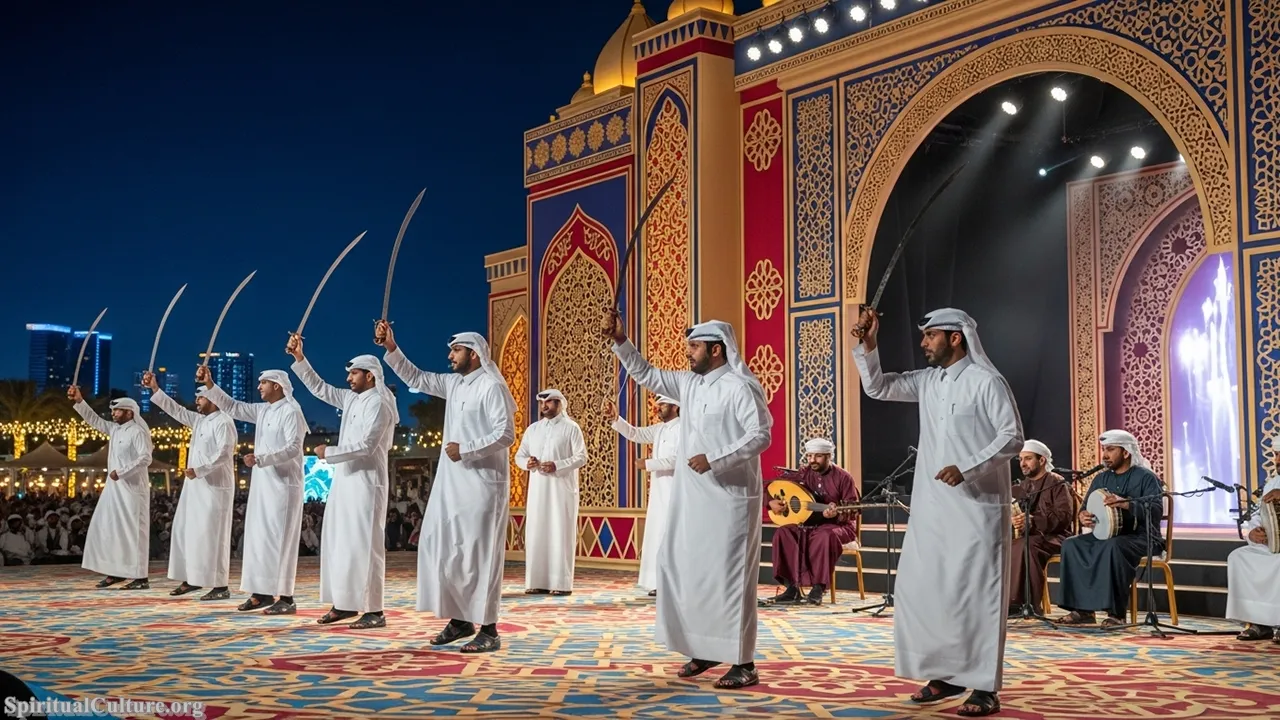
Its significance lies in its direct support of intangible cultural heritage, giving voice to local artists and storytellers who maintain the oral and performative traditions of the region. The festival provides a necessary spiritual nourishment by reinforcing community pride in native arts and bridging the gap between historical artistic practices and contemporary expression. By hosting international participants alongside local masters, it ensures that Qatari culture is celebrated not in isolation, but in global dialogue, strengthening its authoritative position in the Arab cultural sphere.
The moral lesson of the Doha Cultural Festival is the profound understanding that true national development must be rooted in cultural confidence and artistic expression. It reminds the nation that economic growth is only meaningful when accompanied by a thriving creative spirit. Its preservation value rests on its role as a living archive, ensuring that the next generation has access to the songs, stories, and images that define their ancestry.
Cultural/Spiritual Highlights:
- Dedicated showcases for traditional Qatari music and dance forms.
- Features poetry sessions reflecting the deep Arab tradition of oral storytelling.
- Acts as a primary vehicle for promoting local and regional Arab artists.
#9. Ajyal Film Festival
The Ajyal Film Festival, which typically takes place in November, represents a forward-looking cultural institution dedicated to engaging the youth (Ajyal means ‘generations’ in Arabic) through the powerful medium of cinema. Hosted by the Doha Film Institute, it screens films from the Middle East and globally, specifically focusing on narratives that resonate with young audiences and encourage cross-cultural dialogue. As of the Current Time of Writing, it is a key component of Qatar’s strategic investment in a “knowledge-based economy” and a cultural incubator for the future generation of storytellers.
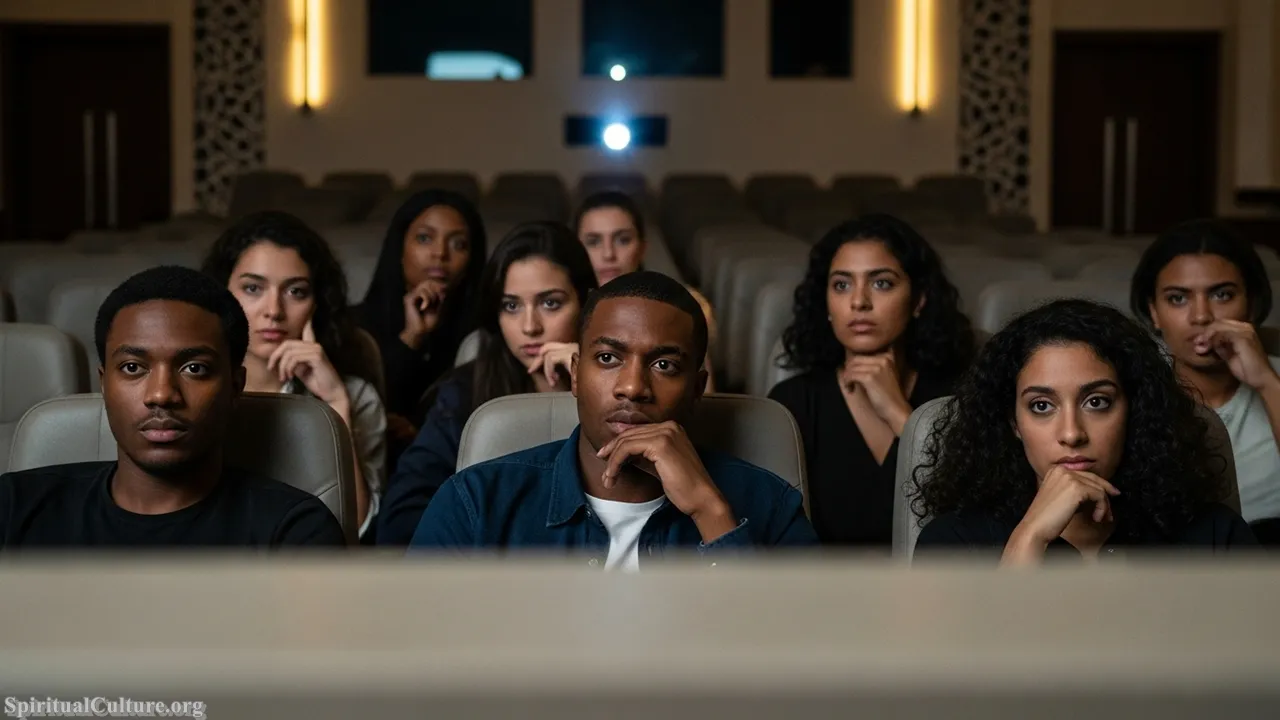
This festival’s reason for ranking stems from its profound spiritual impact as a vehicle for empathy and moral reflection. By showcasing narratives from diverse backgrounds, it cultivates understanding and critical thinking about global issues, encouraging Qatari youth to view their place in the world through a humanistic lens. It empowers young people to articulate their own cultural perspectives and understand the universal threads that connect different societies, making storytelling a spiritual act of shared humanity.
The lasting reflection of the Ajyal Film Festival is the celebration of narrative as a fundamental tool for societal progress and self-discovery. It underscores the moral lesson that heritage is not just about looking backward, but about creating new stories that define the future. Its preservation value lies in developing the cinematic craft within the Arab world, ensuring that authentic, local voices have the technical means to document their history and culture for posterity.
Cultural/Spiritual Highlights:
- Focuses on films that promote moral values and cross-cultural understanding.
- Features the Ajyal Jurors program, empowering youth in critical media analysis.
- Acts as a major platform for emerging Arab filmmakers.
#8. Local Dates Festival
The annual Local Dates Festival, held in the heat of summer around July/August, is a powerful celebration of the date palm—a plant deeply embedded in Arab history, sustenance, and cultural identity. The date is often referred to as the “national fruit” and has been a cornerstone of life in the Gulf for millennia, symbolizing hospitality, resilience, and wealth. The festival, hosted at Souq Waqif, promotes over 30 varieties of dates and directly supports local farms, embodying a commitment to food security and agricultural heritage as of the Current Time of Writing.
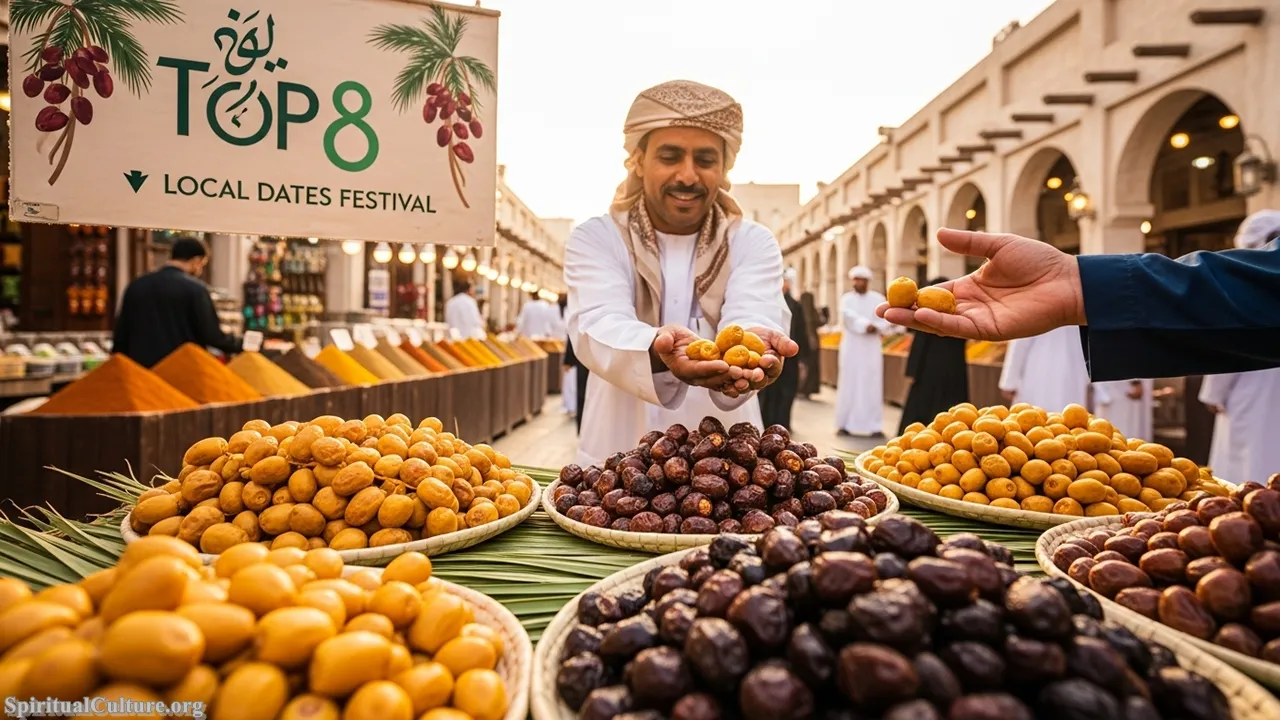
This event merits its place due to its spiritual connection to the land and the tradition of hospitality central to Qatari culture. The date is a staple food for breaking fast during Ramadan, giving it sacred importance in Islamic observance. The festival is a tangible expression of gratitude for the land’s bounty and reinforces the foundational Bedouin values of generosity and shared sustenance. Its ranking is based on celebrating a life-giving resource that holds profound spiritual and historical weight, rather than mere agricultural trade.
The reflection from the Local Dates Festival is a poignant reminder of the value of sustainable living and the wisdom of ancestral practices. The moral lesson is that simple, natural resources often hold the deepest historical and spiritual significance. The preservation value lies in promoting local farming techniques, ensuring that the cultural knowledge associated with date cultivation—a tradition thousands of years old—is not lost to rapid urbanization.
Cultural/Spiritual Highlights:
- Celebrates the date palm, a sacred symbol of sustenance and hospitality in Islam.
- Directly supports local Qatari farms, reinforcing food heritage and self-sufficiency.
- Reflects the ancient tradition of serving dates with Arabic coffee (Qahwa).
#7. Marmi Festival (Falconry)
The Marmi Festival, held early in the year around January and February, is one of the world’s most significant events dedicated to falconry, an ancient desert art form recognized by UNESCO as Intangible Cultural Heritage. Falconry (Al-Qannas) in Qatar is not merely a sport but a noble way of life, symbolizing patience, courage, and the deep, symbiotic relationship between the Bedouin man and the desert landscape. The festival gathers expert falconers for competitions that test the skill and precision inherent in this centuries-old hunting practice.
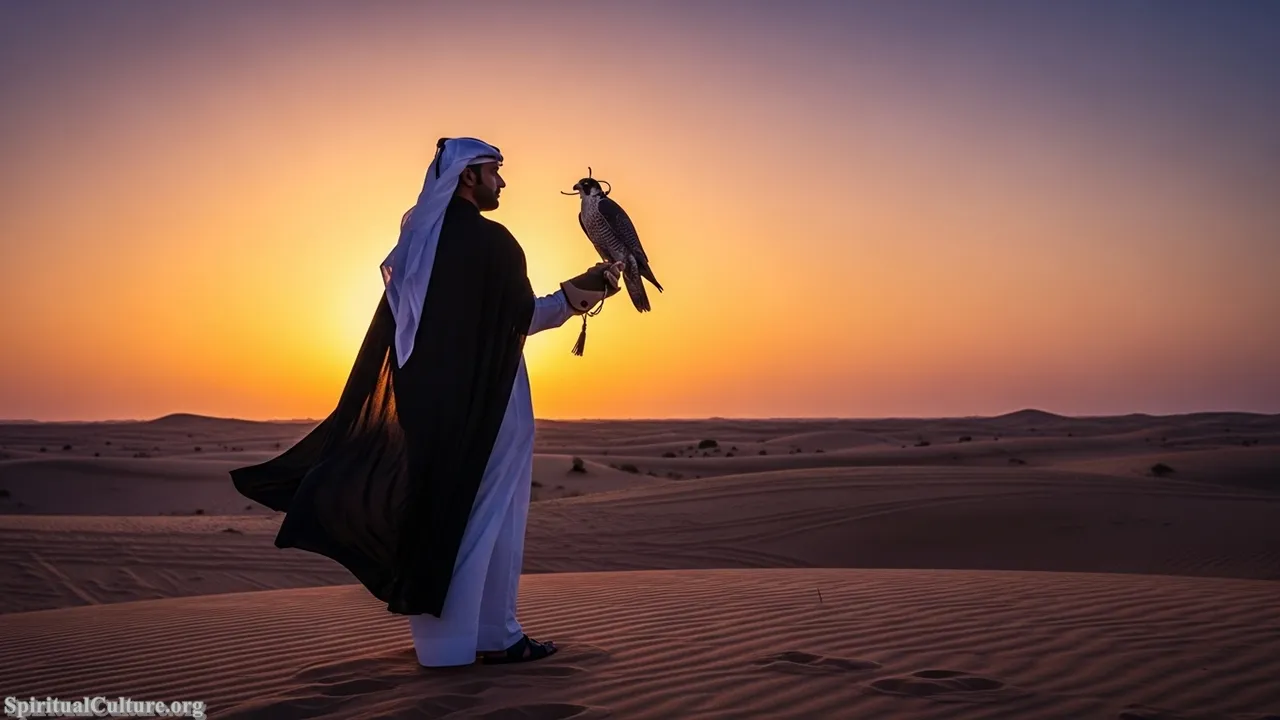
The spiritual impact of Marmi is rooted in its demonstration of fundamental desert virtues. The pursuit of the falcon is a spiritual exercise in discipline and respect for nature, reflecting the historical practices of survival and honour in the Arabian Peninsula. Its ranking is high because it actively keeps alive a practice that defined the Qatari ancestors, teaching values of perseverance and guardianship over the natural world. The festival is a solemn acknowledgment of the profound connection between cultural identity and the austere desert environment.
The final reflection upon Marmi is the recognition that the preservation of traditional hunting methods provides a powerful link to the national character. The moral lesson is the importance of mastery and discipline in any endeavor, whether spiritual or practical. Its preservation value is immense, as the festival ensures that the specialized knowledge, terminology, and tools of falconry are transferred seamlessly between the “generations” (Ajyal), safeguarding a key element of Qatari intangible heritage.
Cultural/Spiritual Highlights:
- Celebrates Falconry, recognized by UNESCO as Intangible Cultural Heritage.
- Reinforces the traditional desert values of patience, discipline, and respect for nature.
- Showcases specialized skills necessary for Bedouin survival in the Arabian Gulf.
#6. Al-Shahaniya Camel Racing
Al-Shahaniya Camel Racing, primarily taking place from October through February, is an essential cultural sport that showcases the enduring Bedouin heritage of the Arabian Gulf. Camel racing has been a centerpiece of Qatari life for generations, a fiercely competitive event that, while modernized with remote-controlled robot jockeys, retains its core historical and cultural significance. The races draw passionate crowds, reinforcing the pride and prestige associated with desert life and the camel—the “ship of the desert.”
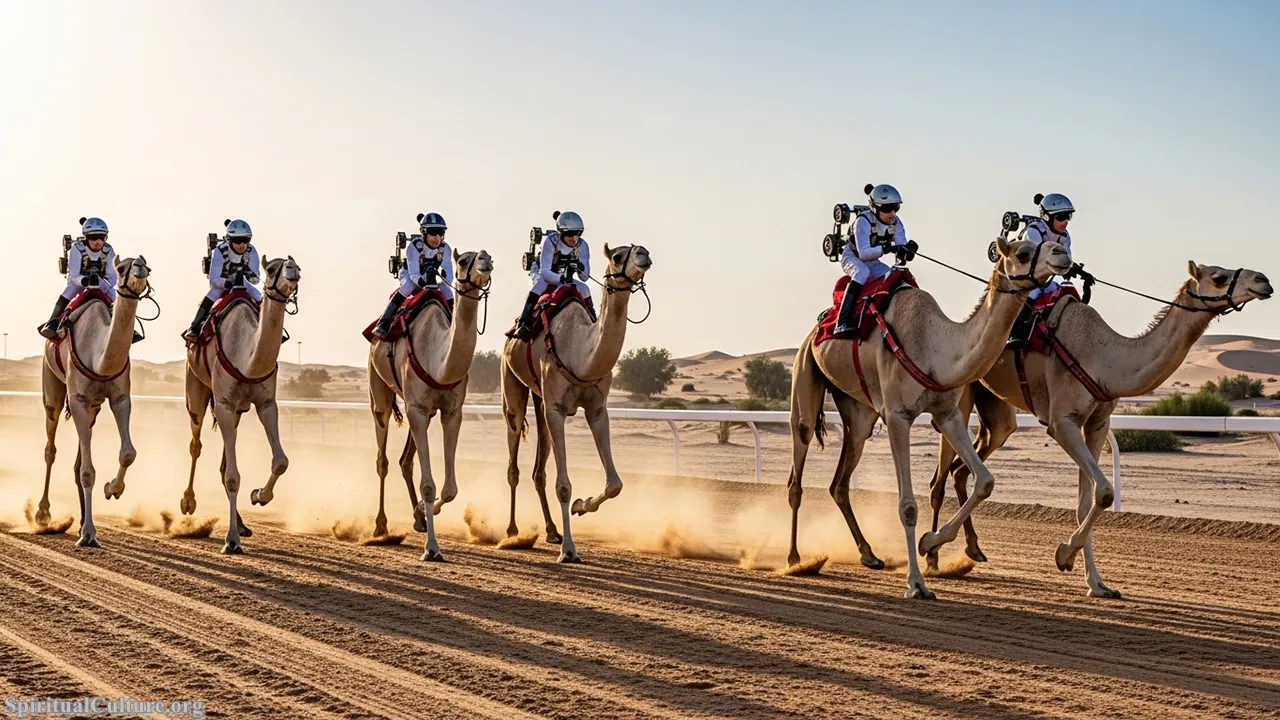
The reason for this event’s ranking is its irreplaceable role in preserving the competitive spirit and traditions of desert nomadism. The speed and endurance of the camels reflect the Qatari reverence for strength and historical self-reliance. It offers a spiritual impact by providing a continuous, tangible link to the lifestyle of the ancestors, celebrating the bond between man and beast that made survival possible in the harsh environment. Despite the technological updates, the deep-seated pride in ownership, training, and heritage remains palpable.
The reflection provided by Al-Shahaniya is an appreciation for how a nation can embrace modernity without abandoning its most foundational pastimes. The moral lesson is that tradition can adapt and thrive, using new technology to ensure its survival rather than conceding to obsolescence. Its preservation value is critical, as it keeps the history of the camel as an engine of the Qatari economy and culture at the forefront of the national consciousness.
Cultural/Spiritual Highlights:
- Celebrates the historical and cultural significance of the camel, the ‘ship of the desert.’
- Maintains the competitive traditions and pride of the Bedouin desert culture.
- Uses modern robot jockeys, illustrating a unique blend of tradition and high-tech innovation.
#5. Garangao Children’s Festival
Garangao is a beloved and unique children’s festival celebrated across Qatar and the Gulf on the 14th night of Ramadan, marking the halfway point of the holy month. This tradition sees children dress in colorful traditional clothing, carrying specially woven bags while singing specific Garangao songs from door-to-door, receiving nuts, sweets, and gifts. Though its exact origins are debated, it is a key cultural observance that instills religious values and community bonds from a young age, acting as a celebratory pause within the solemnity of the fast.
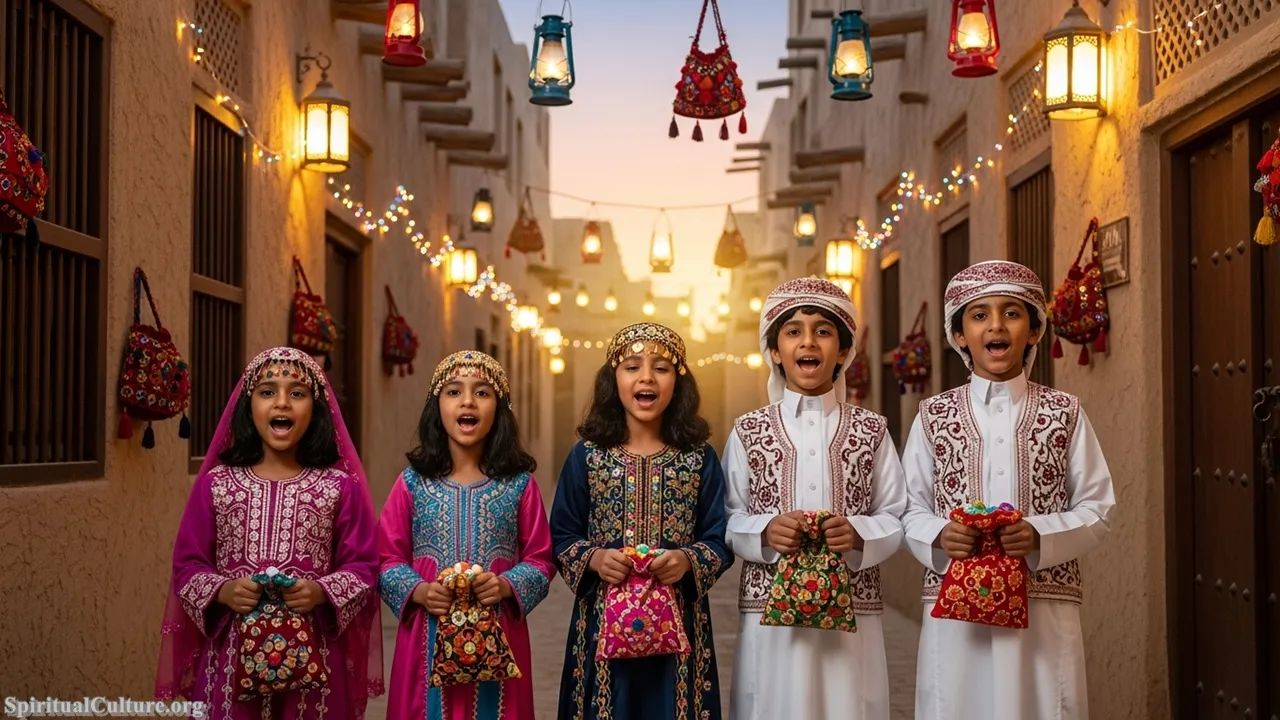
This festival’s high spiritual impact earns its place by fostering early positive association with the act of fasting and charity. It is an intentional cultural mechanism for teaching children the values of generosity, community visitation, and the shared joy of religious practice. The tradition spiritually reinforces the concept of bounty and sharing, transforming a religious obligation into a memorable cultural moment. It ensures that the youth feel actively involved in the communal spiritual journey of Ramadan, even as they observe only parts of the fast.
The reflection of Garangao is the importance of intergenerational cultural transmission, emphasizing the role of children as the future custodians of heritage. The moral lesson is that joy and spiritual duty can coexist in harmonious celebration. Its preservation value is paramount, as it is one of the most effective and intimate ways that Qatari families pass on core religious and cultural customs, song, and traditional dress directly to their youngest members.
Cultural/Spiritual Highlights:
- Celebrated on the 14th night of Ramadan, marking the spiritual midpoint of the fast.
- Reinforces core Islamic values of generosity and community sharing among children.
- Features distinct traditional songs and clothing, fostering early cultural pride.
#4. Katara Traditional Dhow Festival
The annual Katara Traditional Dhow Festival, typically held in late November or early December, is a powerful homage to Qatar’s deep-rooted maritime heritage. Before the discovery of oil and gas, the economy of the Arabian Gulf was largely dependent on fishing, pearling, and sea trade carried out using the iconic wooden Dhow boats. The festival showcases restored dhows, traditional fishing and pearling demonstrations, and related crafts, vividly bringing the seafaring history of the nation to life at the Katara Cultural Village.
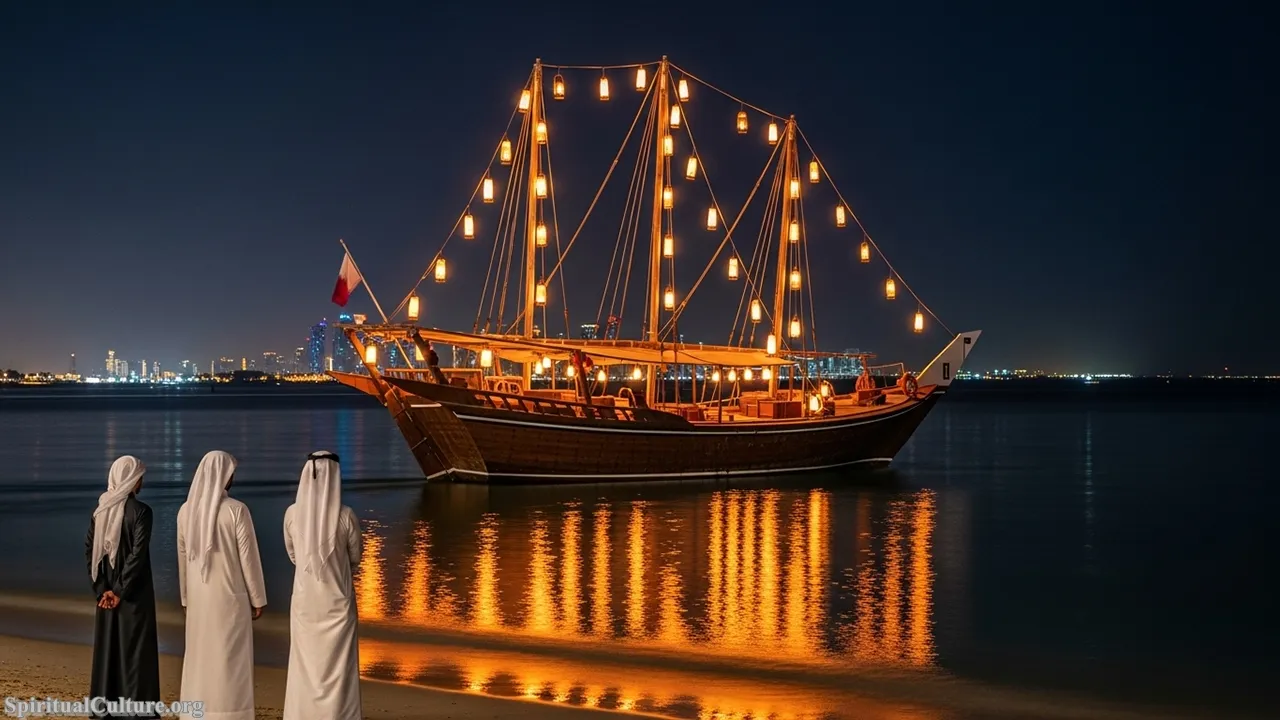
The ranking is justified by the profound historical and spiritual link this festival maintains with the Qatari soul. The sea was the source of both hardship and prosperity, and the life of the pearl diver was one defined by immense faith and reliance on God. This event spiritually honours the courage, patience, and resilience of the ancestors who navigated the dangerous waters, connecting the current generation to the formative chapter of their economic and cultural development. It is a powerful cultural anchor in a country that has been dramatically reshaped by wealth.
The reflection is a heartfelt recognition of the sacrifices made by the pearling and seafaring generations that built the foundation of modern Qatar. The moral lesson is the strength found in communal effort and the enduring dignity of hard work, as symbolized by the beautiful, handcrafted Dhows. Its preservation value is in safeguarding the specialized crafts, ship-building knowledge, and oral histories of the sea, which are essential components of Qatari intangible heritage.
Cultural/Spiritual Highlights:
- Revives the historical practices of pearling, fishing, and sea trade.
- Celebrates the Dhow, a historical symbol of economic survival and cultural ingenuity.
- Preserves traditional Qatari seafaring songs and oral histories.
#3. Eid al-Adha (Festival of Sacrifice)
Eid al-Adha, the “Festival of Sacrifice,” is one of the two most significant religious holidays in Islam, following the completion of the annual Hajj pilgrimage. It commemorates Prophet Ibrahim’s (Abraham’s) ultimate act of obedience to God by being willing to sacrifice his son, an act from which God provided a ram instead. Celebrated over four days (approximately June in 2025), the festival is marked by communal prayers, the ceremonial sacrifice (Qurbani), and the sharing of meat with family, friends, and the needy throughout Qatar.
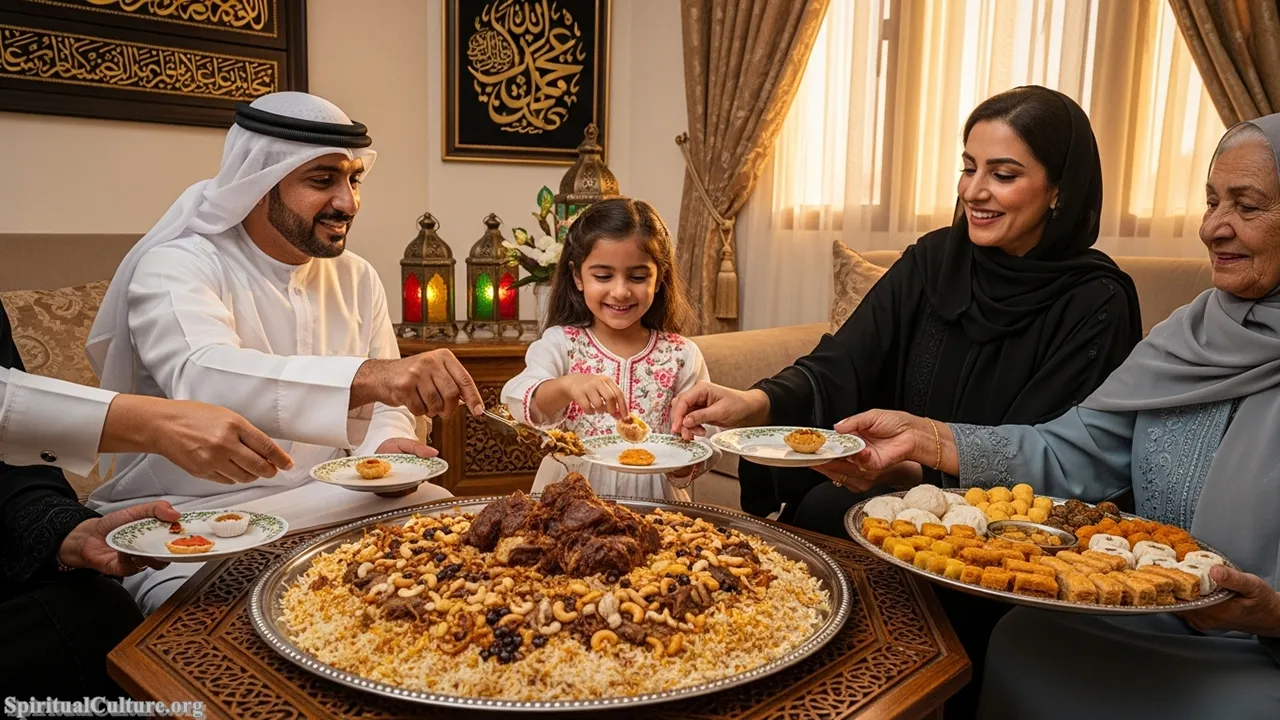
This festival’s spiritual impact is arguably one of the highest of all observances in Qatar, a deeply religious state. The act of Qurbani is a profound expression of devotion, submission (Islam), and gratitude to God, directly reinforcing core tenets of faith that define the nation’s spiritual life. Its ranking reflects its universal observance by the Muslim population, its connection to the global Hajj pilgrimage, and its powerful emphasis on charitable giving and compassion for the less fortunate, a central moral pillar of Islam.
The reflection of Eid al-Adha is the timeless call to obedience and selflessness exemplified by Prophet Ibrahim. The moral lesson is the importance of sharing one’s blessings and the spiritual purification achieved through sacrifice. Its preservation value lies in its power to unite the community in solemn worship and joyous giving, ensuring that the spiritual priorities of the Qatari society remain firmly rooted in religious doctrine and humanitarian concern.
Cultural/Spiritual Highlights:
- Commemorates the spiritual test of Prophet Ibrahim and his submission to God.
- Requires the ritual of Qurbani (sacrifice) and emphasizes widespread charity.
- Serves as a global celebration of faith, coinciding with the annual Hajj pilgrimage.
#2. Qatar National Day (QND)
Observed annually on December 18th, Qatar National Day (QND) is the most significant secular, non-religious public holiday, commemorating the day Sheikh Jassim bin Mohammed Al Thani succeeded his father in 1878 and led the country toward unification. The day is a massive, nationwide celebration of national identity, pride, loyalty, and the historical struggle for independence. Key festivities include the massive military and cultural parade on the Doha Corniche and various heritage activities at Darb Al Saai.
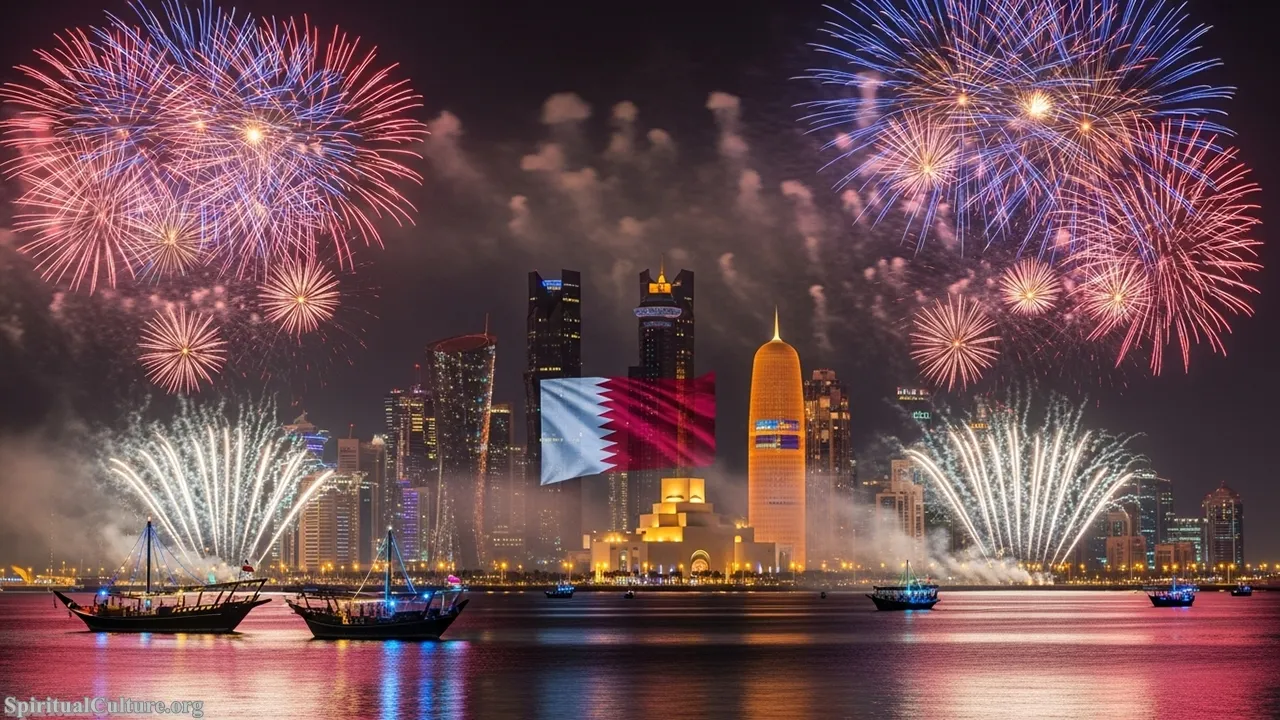
QND earns its high ranking due to its function as the ultimate cultural and historical integrator for all residents. Its deep analytical significance lies in unifying the populace under a shared history, reinforcing the collective national narrative and the values of dignity and sovereignty. It provides a unique spiritual impact by fostering an immense sense of belonging and loyalty (Watan), connecting contemporary progress with the wisdom and efforts of the nation’s founders. The day is a public, joyous reaffirmation of the Qatari social contract.
The reflection provided by QND is an appreciation for the historical journey from fragmented tribes to a unified, modern state. The moral lesson is the power of unity under visionary leadership and the sacrifice inherent in nation-building. Its preservation value is unmatched, as its specific cultural events—like the military parade and heritage zone—are meticulously designed to educate the younger generations and expatriates about the foundational moments and persistent cultural character of Qatar.
Cultural/Spiritual Highlights:
- Commemorates the 1878 unification of the state under Sheikh Jassim bin Mohammed Al Thani.
- Fosters the core national values of loyalty (Watan), pride, and unity.
- Features traditional Qatari performances and the symbolic parade along the Corniche.
#1. Eid al-Fitr (Festival of Breaking the Fast)
Eid al-Fitr stands as the most famous and spiritually profound festival in Qatar, marking the joyful conclusion of Ramadan, the holy month of fasting, prayer, and reflection. Occurring on the first day of Shawwal (approximately late March/early April in 2025), it is a national celebration spanning several days, characterized by communal morning prayers, family gatherings, the giving of obligatory charity (Zakat al-Fitr), and general feasting. The entire nation transforms into a scene of communal joy and spiritual gratitude following a month of intense devotion.
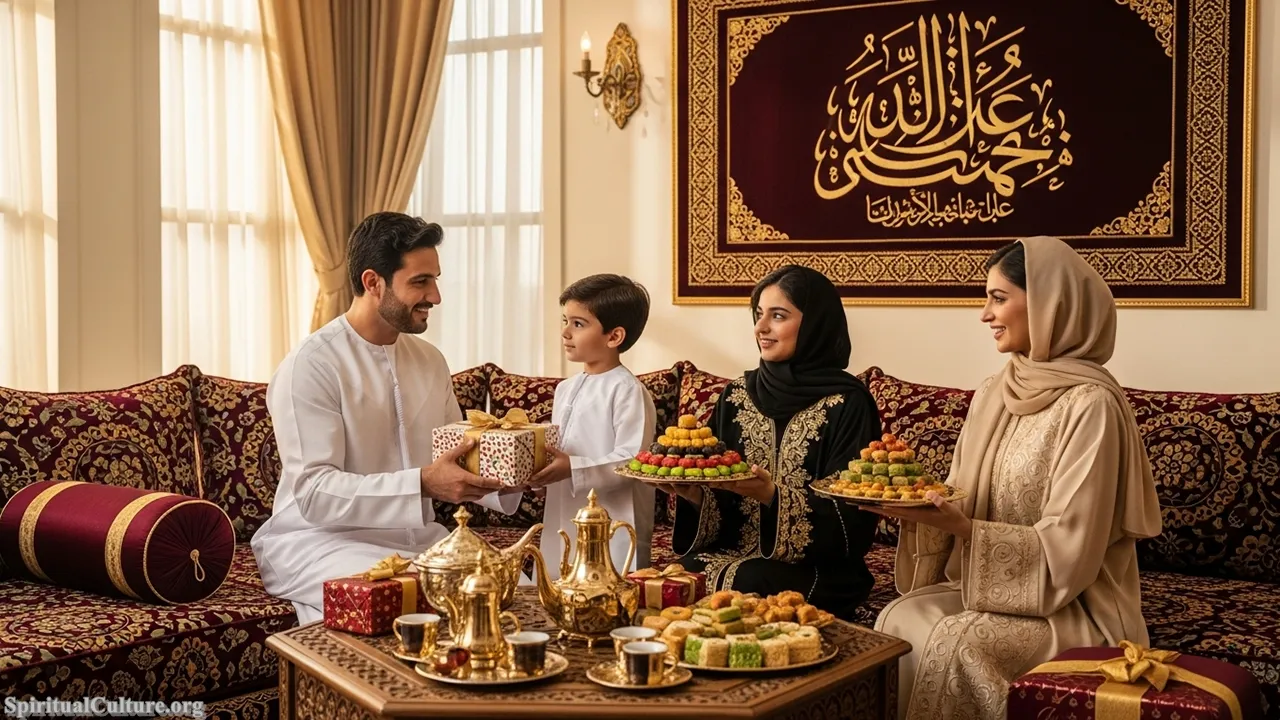
This festival is ranked highest because its spiritual and communal impact is the most pervasive and deeply felt across the entire Qatari society. It is the culmination of the spiritual discipline of Ramadan, providing a collective reward and a powerful ritual of thanksgiving to God. The act of Zakat al-Fitr, which must be given before the morning prayer, reinforces the fundamental Islamic pillar of charity, making the celebration intrinsically tied to moral responsibility and compassion for the poor. It embodies the full spiritual cycle of the Qatari year.
The final reflection of Eid al-Fitr is the transcendent beauty of returning to the simple joys of food, family, and community after a period of self-denial. The moral lesson is the powerful realization that true abundance comes not just from wealth, but from spiritual discipline and generosity. Its preservation value is supreme, as it is the most central and defining ritual of the nation’s faith, ensuring that Islamic principles remain the unshakable foundation of Qatari culture and society for every generation.
Cultural/Spiritual Highlights:
- The culmination of Ramadan, marking the highest point of spiritual discipline and devotion.
- Mandates the giving of Zakat al-Fitr, reinforcing the pillar of charity and care for the needy.
- Defined by communal Eid prayers and widespread family and community feasting.
A Heritage Rooted in Faith and Resilience
The cultural festivals of Qatar are far more than seasonal spectacles; they are profound reaffirmations of a national identity balanced between deep historical respect and a confident stride toward the future. As we have explored through this Spiritual Culture guide, the true measure of a festival’s importance lies not just in its size, but in its ability to connect the community to its foundational spiritual values—from the collective joy and charity of Eid al-Fitr to the unifying pride of Qatar National Day.
In a world of rapid transformation, these Top 10 festivals—be they celebrating the endurance of the camel, the skills of the falconer, or the sacred journey of Ramadan—act as essential cultural anchors. They ensure that the moral lessons of generosity, resilience, and faith, taught by the ancestors, continue to guide the modern Qatari state. They stand as a vibrant, living testament to the fact that heritage is best preserved not in museums, but in the joyous, collective participation of the people.
Spiritual Culture celebrates Qatar’s success in weaving tradition seamlessly into its contemporary narrative. These festivals invite both residents and visitors to look beyond the glittering skyline and experience the profound humanistic heart of the Arabian Gulf.
